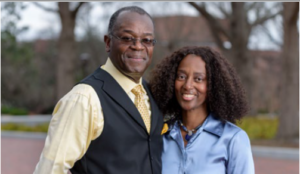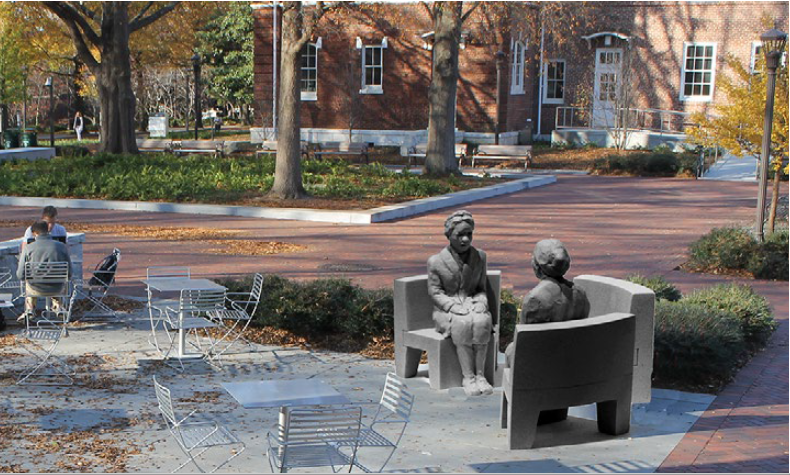
Donors invest in the power of art to
expand knowledge and inspire courage
Rod Adkins, who worked for IBM for 33 years and is now president of CRAM Group, has served on the Georgia Tech Advisory Board and the Electrical Engineering Advisory Board, and currently serves on the Georgia Tech Foundation Board of Trustees. Michelle Adkins currently serves on the Alumni Association Board of Trustees.
Rosa Parks never set foot on the Georgia Tech campus, but the impact of her decades-long battle for equality and justice cannot be confined to a single geographical location or historical era. Like with all great heroes, her life and work are transcendent.
Now, Rodney C. Adkins, EE 1981, MS EE 1983, HON Ph.D. 2013, and Michelle L. Adkins, IMGT 1983, are hoping that a statue of the civil rights icon — to be unveiled in Harrison Square on April 5 — will inspire current and future generations of Tech students to learn more about Parks and discover their own courage. The couple have provided full philanthropic support for the piece, and they are enthusiastic about its potential impact on campus.
“She wasn’t tired, and she wasn’t old,” Michelle said, referring to Parks’ refusal in 1955 to relinquish her seat to a white passenger on a segregated bus in Montgomery, Alabama — an action for which she was arrested. “She was tired of giving in. That lesson in itself is good for our young generation: It’s important to stand up for what you believe in. I think that’s something Tech students and the Atlanta community — all people in general — can take a lesson from.”
“This project felt right,” Rod added. “It felt like it integrated all of the things we stand for. We are really proud that it’s going to be on the campus of Georgia Tech.”
The bronze statue, titled Continuing the Conversation, was designed and created by Atlanta sculptor Martin Dawe. It depicts Parks at age 42 — the year her courageous act launched the Montgomery Bus Boycott and a movement that would reshape the nation — and at age 92, the year she died. They sit across from each other, with an empty seat between them, inviting passersby to participate.
Dawe came up with the concept a few years ago, and he shared it with Madison Cario, director of Tech’s Office of the Arts, and Rafael L. Bras, provost and executive vice president for Academic Affairs and the K. Harrison Brown Family Chair. The piece, they agreed, would be a perfect fit for Georgia Tech.
“It is important to keep this history alive, because that conversation that Rosa Parks carried, with herself and with the people of the United States, needs to continue,” Bras said. “I think we are obliged to remind and educate our students of that history and challenge them to do the same.”
Dawe, the owner of Cherrylion Sculpture Studios in Midtown Atlanta, designed the Rosa Parks statue as an interactive educational piece. A website and an audio file are being planned to provide visitors with additional biographical and historical information.
“The name of the piece is Continuing the Conversation, so that’s the effect it should be having,” Dawe said. It is also meaningful to him that the statue will live at Georgia Tech. Though a graduate of Georgia State University, Dawe apprenticed with Tech professor and sculptor Julian Harris, ARCH 1928, for eight years. “My heart is at Tech, because that’s where my career started,” he said. “I wouldn’t have a career if I hadn’t gotten that job.”
For Michelle and Rod Adkins, that connection is even more heartfelt. They attribute their many professional achievements in part to their Tech education and have devoted more than three decades of vital philanthropic support and service to their alma mater, most significantly by endowing President’s Scholarships and Dean’s Scholarships within the Ernest Scheller Jr. College of Business and the School of Electrical and Computer Engineering.
“This was an opportunity for us to continue our support for Georgia Tech,” Rod explained. To him, the sculpture is a statement “that we are proud African- Americans and we are proud to be associated with Georgia Tech.”
And what does he imagine a young Rosa Parks saying to an older Rosa Parks, or vice versa? “I think the conversation would center around reflecting on our past — but also anticipating and embracing, with excitement, how we’re going to shape the future.”

This rendering shows how Continuing the Conversation will be situated on Harrison Square. Madison Cario, director of Georgia Tech’s Office of the Arts, believes the sculpture will inspire the entire campus community. “It illuminates history,” she said, “and welcomes us to become a part of it.”
